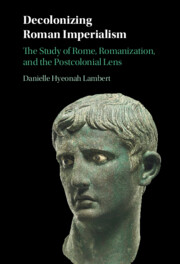Book contents
- Decolonizing Roman Imperialism
- Decolonizing Roman Imperialism
- Copyright page
- Dedication
- Contents
- Acknowledgements
- Introduction
- Chapter 1 The Discourse on Romanization in the Age of Empires
- Chapter 2 Postcolonial Themes
- Chapter 3 Postcolonial Questions in the Age of Decolonization
- Chapter 4 Towards a Paradigm Shift in the Age of Globalization
- Historical Intervention
- References
- Index
Chapter 4 - Towards a Paradigm Shift in the Age of Globalization
Published online by Cambridge University Press: 03 October 2024
- Decolonizing Roman Imperialism
- Decolonizing Roman Imperialism
- Copyright page
- Dedication
- Contents
- Acknowledgements
- Introduction
- Chapter 1 The Discourse on Romanization in the Age of Empires
- Chapter 2 Postcolonial Themes
- Chapter 3 Postcolonial Questions in the Age of Decolonization
- Chapter 4 Towards a Paradigm Shift in the Age of Globalization
- Historical Intervention
- References
- Index
Summary
In the multi-ethnic and multi-cultural fabric of major cities in the post-colonial world, postcolonialism presented fresh possibilities for new history. It allowed Roman historians and archaeologists to reflect upon and break through the imperialist historiography of Roman history and to reach out to the intellectual discourse of the postcolonial age. Three prominent scholars who reoriented Romanization studies in the twenty-first century, Webster, Hingley, and Mattingly, turned their attention to the lower strata of the colonial power structure, the colonized and silent Other outside the hegemonic system of power and knowledge/truth – that is, the subaltern – and presented their alternative paradigms in postcolonialist vocabulary: creolization, globalization, and discrepant experiences, respectively. Pushing epistemological boundaries to the subaltern Other in the Roman Empire, they exposed Romano-centric and Eurocentric epistemologies underlying the paradigm of Romanization itself.
- Type
- Chapter
- Information
- Decolonizing Roman ImperialismThe Study of Rome, Romanization, and the Postcolonial Lens, pp. 151 - 196Publisher: Cambridge University PressPrint publication year: 2024

